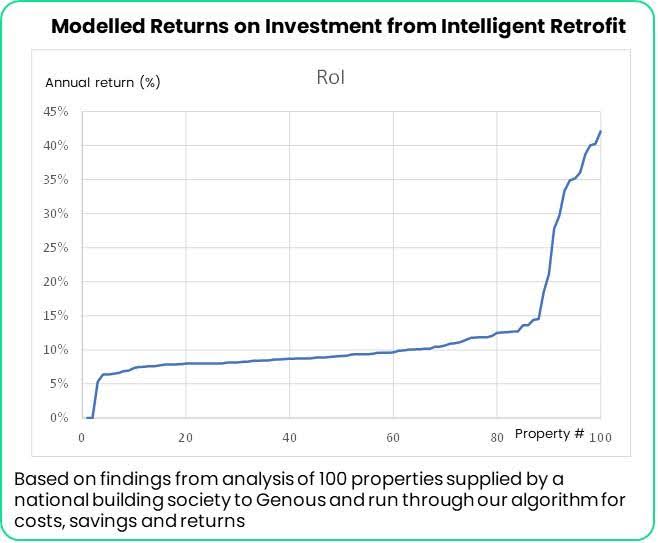By Simon Bones founder of Genous
Most business leaders are aware of their company’s environmental impact. But with 25% of the UK’s emissions coming from households, that means our homes—through heating, electricity use, and fuel consumption—are also a big part of the problem. So, what can CEOs do about it on a personal level?
Many leaders assume that retrofitting their homes to be more energy efficient is purely a move to help the planet. But it can also be a smart financial decision. While most energy efficiency initiatives focus on helping lower-income households, that doesn’t mean retrofitting isn’t a good investment for those who can afford to do it properly. The key is making informed, strategic choices.
Why Home Retrofitting Can Be a Smart Investment
If energy efficiency is so beneficial, why is it often subsidised? The reality is that affordability is the main barrier, and when subsidies are involved, the quality of installations can sometimes suffer. But when done right, retrofitting can significantly reduce energy costs while potentially also boosting home value.
At Genous, we’ve found that high-income households, particularly those with larger properties, can see the biggest financial benefits from retrofitting. Here’s why:
- Bigger Homes, Bigger Savings
Larger homes cost more to heat, and bigger cars burn more fuel. If you own a spacious home in the countryside, your heating bill is likely substantial. But that also means there’s more room to cut costs. For example, installing a heat pump or solar panels in a larger home often yields better returns simply because the energy consumption is higher to begin with. - Higher-Quality Equipment Means Better Efficiency
Not all renewable energy systems are created equal. Premium heat pumps, for instance, can be up to 90% more efficient than standard ones—but they come at a higher upfront cost. The same goes for smart energy systems, underfloor heating, and other high-tech solutions. While budget constraints may limit some homeowners’ choices, those who can afford top-tier equipment often see better results in the long run. - Financing Options Can Make It Even More Attractive
For those with the financial flexibility to fund retrofitting through savings or mortgage extensions, the returns can be very appealing. Our analysis of 100 properties found that the vast majority could achieve at least a 6.5% return—before even factoring in savings from an electric vehicle.
If you’re a saver then it’s even better: the benefit from retrofit and self-charging an EV comes off your bills and at the fuel pump, both of which are post-tax, whereas (ISAs-aside) most investment income or gains need tax paying on them, which for most CEOs will be at a high marginal rate. Double-digit post-tax returns that don’t require you to wait double-digit years for you to get your income could be attractive, depending on your other investment options and financial status.
Is Retrofitting Right for You?
 Of course, not every home is a perfect candidate for retrofitting. Local planning laws, property constraints, and energy infrastructure can all play a role. But for many CEOs and high-income homeowners, it’s an opportunity to cut costs, improve home comfort, and set an example in sustainability. After all, leadership isn’t just about running a business—it’s about making smart, forward-thinking decisions in all aspects of life.
Of course, not every home is a perfect candidate for retrofitting. Local planning laws, property constraints, and energy infrastructure can all play a role. But for many CEOs and high-income homeowners, it’s an opportunity to cut costs, improve home comfort, and set an example in sustainability. After all, leadership isn’t just about running a business—it’s about making smart, forward-thinking decisions in all aspects of life.
CEOs who lead from the front in sustainability will naturally impact the rest of their team. By talking the talk and walking the walk both at home and in the office, they can take real, sizable steps to reduce the company and the team’s carbon emissions.
And what’s to say the next company incentive couldn’t be a solar panel install? Or the bonus of a heat pump installation?
In these hybrid-working times, for those who haven’t demanded the team back into the office, there’s a real opportunity for CEOs to take big and bold steps to reduce not just their own carbon output but that of the company both in, and outside of the office while also helping to support teams through the continued cost of living crisis. It’s a win for the planet and a win for the team’s budgets.
 About the author
About the author
Simon Bones is the founder and CEO of Genous, the UK’s premium home retrofit company. Focused on professionalism and personalised service, Simon has combined his expertise in climate change science and energy and infrastructure services with his personal experience of delivering multiple home retrofits to help shift the public’s mindset and bring us closer to a more energy efficient and greener future.
His philosophy centres around empowering people to improve their properties and embrace environmentally and wallet friendly solutions. Identifying a knowledge gap among almost all consumers when it comes to renewable solutions and with no company able to provide high service solutions across multiple categories of home energy savings, Genous was born, with a commitment to simplifying the process and educating customers at the same time.
Prior to Genous, Simon was co-founder and managing partner of international strategy consultancy Credo, which he successfully sold to CVC Capital-backed Teneo and where he focused on construction/property, infrastructure and energy services. He has personally also retrofitted multiple properties, installing insulation, performance glazing, smart controls, solar panels, heat pumps and biomass heating systems along with EV charging upgrades.
A published academic, Simon is a Visiting Research Fellow in climate change science at the University of Bristol and has Masters’ degrees from Oxford University and Bristol in Physics & Philosophy and Climate Change Science & Policy respectively.


